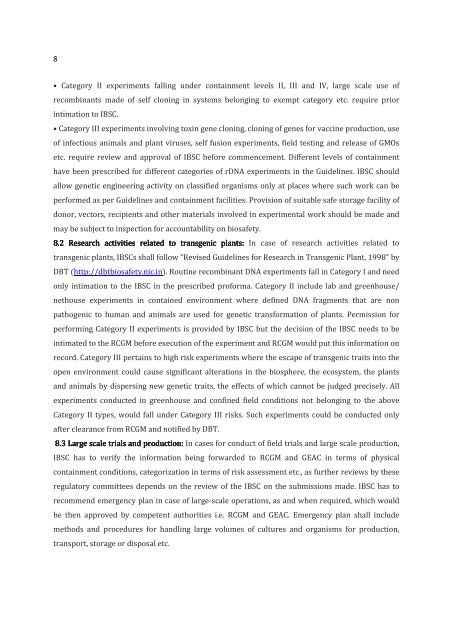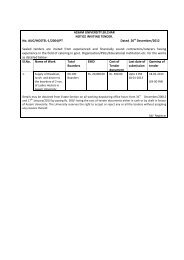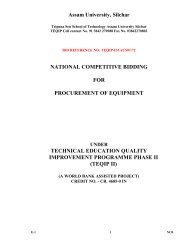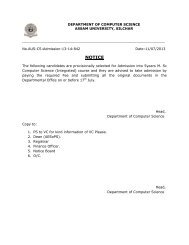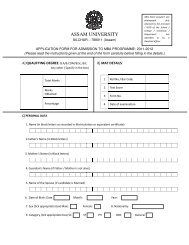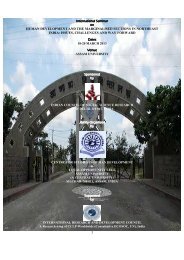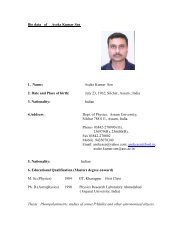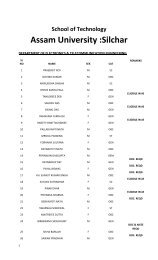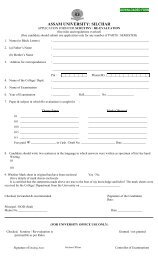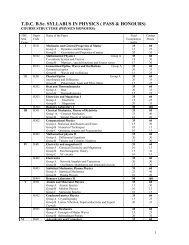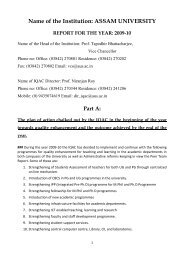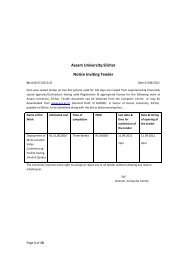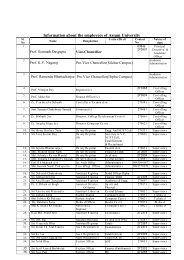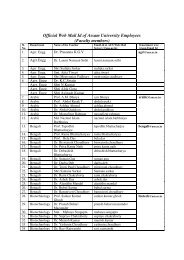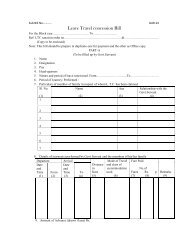Institutional Biosafety Committee(IBSC) - Assam University
Institutional Biosafety Committee(IBSC) - Assam University
Institutional Biosafety Committee(IBSC) - Assam University
Create successful ePaper yourself
Turn your PDF publications into a flip-book with our unique Google optimized e-Paper software.
8<br />
• Category II experiments falling under containment levels II, III and IV, large scale use of<br />
recombinants made of self cloning in systems belonging to exempt category etc. require prior<br />
intimation to <strong>IBSC</strong>.<br />
• Category III experiments involving toxin gene cloning, cloning of genes for vaccine production, use<br />
of infectious animals and plant viruses, self fusion experiments, field testing and release of GMOs<br />
etc. require review and approval of <strong>IBSC</strong> before commencement. Different levels of containment<br />
have been prescribed for different categories of rDNA experiments in the Guidelines. <strong>IBSC</strong> should<br />
allow genetic engineering activity on classified organisms only at places where such work can be<br />
performed as per Guidelines and containment facilities. Provision of suitable safe storage facility of<br />
donor, vectors, recipients and other materials involved in experimental work should be made and<br />
may be subject to inspection for accountability on biosafety.<br />
8.2 Research activities related to transgenic plants: In case of research activities related to<br />
transgenic plants, <strong>IBSC</strong>s shall follow “Revised Guidelines for Research in Transgenic Plant, 1998” by<br />
DBT (http://dbtbiosafety.nic.in). Routine recombinant DNA experiments fall in Category I and need<br />
only intimation to the <strong>IBSC</strong> in the prescribed proforma. Category II include lab and greenhouse/<br />
nethouse experiments in contained environment where defined DNA fragments that are non<br />
pathogenic to human and animals are used for genetic transformation of plants. Permission for<br />
performing Category II experiments is provided by <strong>IBSC</strong> but the decision of the <strong>IBSC</strong> needs to be<br />
intimated to the RCGM before execution of the experiment and RCGM would put this information on<br />
record. Category III pertains to high risk experiments where the escape of transgenic traits into the<br />
open environment could cause significant alterations in the biosphere, the ecosystem, the plants<br />
and animals by dispersing new genetic traits, the effects of which cannot be judged precisely. All<br />
experiments conducted in greenhouse and confined field conditions not belonging to the above<br />
Category II types, would fall under Category III risks. Such experiments could be conducted only<br />
after clearance from RCGM and notified by DBT.<br />
8.3 Large scale trials and production: In cases for conduct of field trials and large scale production,<br />
<strong>IBSC</strong> has to verify the information being forwarded to RCGM and GEAC in terms of physical<br />
containment conditions, categorization in terms of risk assessment etc., as further reviews by these<br />
regulatory committees depends on the review of the <strong>IBSC</strong> on the submissions made. <strong>IBSC</strong> has to<br />
recommend emergency plan in case of large-scale operations, as and when required, which would<br />
be then approved by competent authorities i.e. RCGM and GEAC. Emergency plan shall include<br />
methods and procedures for handling large volumes of cultures and organisms for production,<br />
transport, storage or disposal etc.


